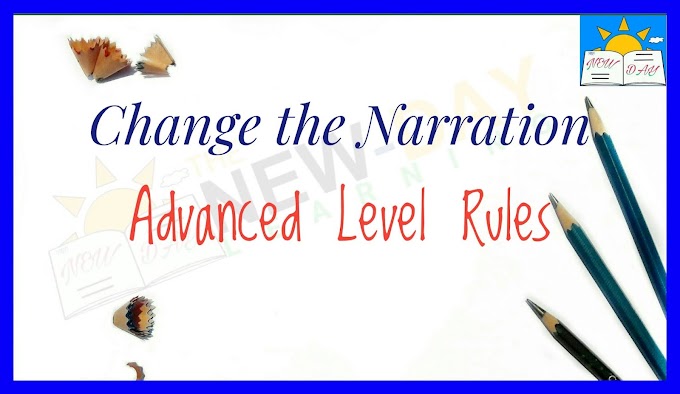Wondering how to change an assertive sentence into an interrogative one? Want to learn Interchange of assertive and interrogative sentences?
Hey there, this is Souvik.
In this article, we'll be talking about how to change an assertive sentence to an interrogative one and vice versa.
Before diving into the article, we need to know what exactly an assertive sentence and an interrogative sentence are.
Well.
Assertive sentences are those sentences, used to assert something while the interrogative sentences are used to ask questions.
Start with -
Transformation of Interrogative Sentence into Assertive Sentence:
The most important rule is -
When you interchange an assertive and an interrogative sentence, you must change the tone. Tone is - being affirmative or negative.
I mean, If the assertive sentence is affirmative, the interrogative will be negative, and if it is negative, then the assertive will be affirmative.
Clear?
But why we need change the tone?
The answer is here —
Interrogative sentences are of two types-
i) Yes-No Questions and ii) WH Questions.
A yes-no question is asked to be sure of something. Like, if I ask you “Did I call you?”, it means I want you to confirm whether I called you or not.
Actually there is a hidden negative meaning in the question, as — “Did I call you?” is equal to “I did not call you.” Hence your answer to this question should be a negative confirmation – “No.”
Similarly, “Are you afraid of him?” is equal to “You are (should) not afraid of him.” Again your answer would be – “No, I am not.”
While on the other hand, a negative yes-no question bears an affirmative meaning which is understood. Like,
When I ask you, “Aren’t you afraid of him?” I mean “You are afraid of him” and the answer of this question will be “yes, I am afraid of him.”
If your friend asks you “Didn’t I play cricket?”, he or she means “I play cricket.” – and you will answer “Yes, you did.”
So what did you learn up to here?
Whenever you are asked to change a yes-no question to an assertive sentence, you simply put the hidden meaning of the question and nothing alse. As –
Interrogative – Did I call you?
Assertive – I did not call you.
Interrogative – Didn’t I play cricket?
Assertive – I played cricket.
Question – Affirmative.
Hidden Meaning – Negative.
Question – Negative.
Hidden Meaning – Affirmative.
For this reason the tone (negative or positive) of the transformed assertive sentence must be changed, — affirmative becomes negative, negative becomes affirmative.
Examples:-
Interrogative – Do I tease you? [Turn into assertive.]
To turn an Interrogative sentence into an assertive one,
Firstly, determine the tense of the Interrogative sentence.
Yes, here it is in present indefinite tense.
Secondly, if it is an indefinite (present or past), place the auxiliary verb Do/Did/Does after the subject.
Here the auxiliary verb is Do. Put it after the subject.
Assertive – I do ...
Thirdly, Use the respective form (1st form / 2nd form / 3rd form) of the main verb.
Here, as our interrogative sentence is in simple present tense, we'll use the 1st form of the main verb 'tease'.
Assertive – I do tease you...
And lastly, don’t forget to remove the question mark (‘?’).
Assertive – I do teas you.
Wait,
We forgot to change the tone.
I mean, as the interrogative is affirmative, the assertive will be negative.
To make it negative, simply put a ‘not’ after the auxiliary verb ‘Do’.
So, the correct transformation will be—
Assertive – I Do not tease you.
Likewise,
Interrogative – Is John a liar?
Assertive – John is not a liar.
Interrogative – have I told her that you are a cheater?
Assertive – I haven't told her that you are a cheater.
Interrogative – Did you inform me before?
Assertive – You did not inform me before.
Interrogative – Was I bothering you while turning the corner?
Assertive – I was not bothering you while turning the corner.
See when the Interrogative sentence is negative -
Interrogative – Does not he play well?
As the assertive sentence is negative, the interrogative will be affirmative after transformation.
Assertive – He plays well.
Interrogative – Is not he a liar?
Assertive – He is a liar.
Similarly,
Interrogative – Didn't Sam brought a new ball?
Assertive – Sam brought a new ball.
Interrogative – Does not the girl top her class every year?
Assertive – The girl tops her class every year.
Related: 11 Rules to transform Affirmative Sentences into Negative Sentences.
Rules to Transform Assertive Sentences into Interrogative Sentences – Yes-No Questions:
Rule 1:
Using Do-verb:
If an assertive sentence has an action verb, a do-verb is used in the interrogative sentence and use a negative word with the do verb.
E.g. –
Assertive – I love chocolates. [Turn it into Interrogative]
Firstly, determine the tense of the assertive sentence.
Secondly, if it is an indefinite (present or past), use an auxiliary verb before the subject. Here the auxiliary verb will be a do verb (Do/Did/Does).
[Use Do for present indefinite tense, Dose for present indefinite tense if the subject is a third person singular number, Did for past indefinite tense.]
Thirdly, Use the base form of the main verb.
And lastly, don’t forget to put a question mark (‘?’).
Here we find that the assertive “I like chocolates.” Is in present indefinite tense, and the subject is not a 3rd person singular.
So, the suitable do verb here will be ‘Do’
The main verb here is ‘love’. The base form of ‘love’ is ‘love’ itself.
The interrogative will be—
Interrogative – Do I love chocolates?
Other examples-
Assertive – They play chess.
Interrogative – Don’t they play chess?
Assertive – I don’t smoke.
Interrogative – Do I smoke?
Assertive – Kamal did not pay the bill.
Interrogative – Did Kamal pay the bill?
Assertive – I don’t read comics.
Interrogative – Do I read comics?
Rule 2:
Be-Verb:
If there is a be verb (after the subject) in an assertive sentence, place the be verb before the subject and use a negative word with the be verb.
E.g. –
Assertive – I am cleaning the floor.
Interrogative – Am not I cleaning the floor?
Assertive – She is smart.
Interrogative – is not she smart?
Assertive – You are a good boy.
Interrogative – Are not you a good boy?
Assertive – Naynika was driving.
Interrogative – Was not Naynika driving?
Assertive – They were throwing stones at the dog.
Interrogative – Weren’t they throwing stones at the dog.
See more: Transformation of Simple and Complex Sentences
Rule 3:
Have verb:
If there is a have verb (after the subject) in an assertive sentence, place it before the subject and use a negative word with the have verb.
E.g. –
Assertive – We have won the cricket tournament.
Interrogative – Haven’t we won the cricket tournament?
Assertive – She has made us laugh.
Interrogative – Hasn’t she made us laugh?
Assertive – Meena had saved the child.
Interrogative – Hadn’t Meena saved the child?
Rule 4:
Modal Auxiliary Verbs:
If there is a modal verb (right after the subject) in an assertive sentence, place it right before the subject and use a negative word with the modal verb.
E.g. –
Assertive – She can do better.
Interrogative – Can't she do better?
Rules to Transform Assertive Sentences into Interrogative Sentences - WH Questions:
Rule 1:
Use ‘Who’:
If an assertive sentence starts with ‘Everybody’, ‘Everyone’, replace it with ‘Who’ to form a wh question.
Change the tone (Affirmative > Negative, Negative > Affirmative).
E.g. –
Assertive – Everybody was excited.
Interrogative – Who was not excited?
Assertive – Everyone respects her.
Interrogative – Who doesn’t respect her?
If an assertive sentence starts with ‘Nobody’ or ‘No one’, again replace it with ‘Who’ to form a wh question.
Change the tone (As ‘Nobody’, ‘No one’ are negative words, any sentence, they are used in is a negative sentence. So, make it affirmative while transformation).
E.g. –
Assertive – No one was interested.
Interrogative – Who was interested?
Assertive – Nobody cares about you.
Interrogative – Who cares about you?
Rule 2:
Use ‘What’:
If there is a ‘nothing’ or ‘not...anything’ in an assertive sentence, remove it and start with ‘what’ to make an interrogative sentence.
E.g. –
Assertive – He said nothing else.
Interrogative – What else did he say?
Assertive – She does nothing all the time.
Interrogative – What does she do all the time?
Assertive – She can not do anything.
Interrogative – What can she do?
Assertive – I did not buy anything.
Interrogative – What did I buy?
Rule 3:
Use ‘Why’:
If is “It is useless” or “It is no use” in an assertive sentence, then replace it with the wh word ‘why’.
E.g. –
Assertive – It is useless to wait for her. [Turn it into interrogative]
Simply replace “It is useless to” with ‘why’.
Interrogative – Why wait for her?
Other examples:–
Assertive – It is useless to make you a member of our team .
Interrogative – Why make you a member of our team?
Assertive – It is no use to go there by plane.
Interrogative – Why go there by plane?
Assertive – It is no use getting married.
Here use the base form of the non-finite verb ‘getting’. The base form is ‘get’.
Interrogative – Why get married?
Rule 4:
Use ‘When’:
If there is a ‘never’ in the assertive sentence, remove it and start with ‘When’ to make it interrogative.
E.g. –
Assertive – You never help us.
Interrogative – When do you help us?
Assertive – She never talks about her past.
Interrogative – When does she talks about her past?
Assertive – I never told a lie.
Interrogative – When did I tell a lie?
Assertive – You have never seen you in the playground.
Interrogative – When have I seen you in the play ground?
Thank you...





%20(1).webp)


%20(1).webp)
5 Comments
It's very useful for me. Thanks for your information. 🤝
ReplyDeleteThanks a lot.
ReplyDeleteIt is no use to go there by plane or it is no use going there by plane ?
ReplyDeleteI think no use takes ing form.
It is useless to offer bread to a man who is dying of thirst.
ReplyDeleteAppreciate this blog posst
ReplyDeleteLeave a comment